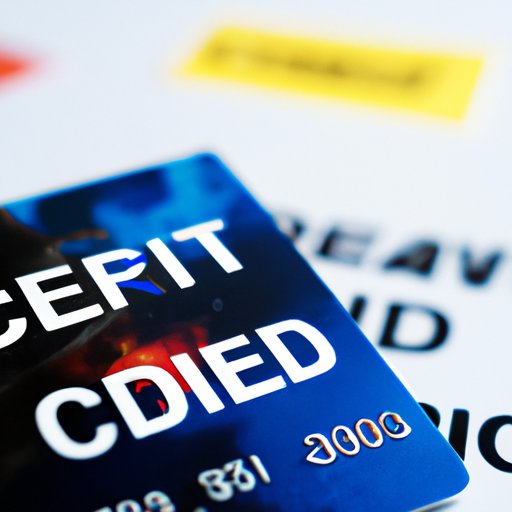
I. Introduction
Credit card debt can be overwhelming for many people. It’s easy to get caught up in the cycle of making minimum payments and accruing more debt, resulting in high interest rates and never-ending bills. However, there are ways to take control of your debt and work towards a debt-free life. The purpose of this article is to provide tips and strategies to help readers get rid of their credit card debt.
II. Prioritize Repayment
When it comes to getting rid of credit card debt, prioritizing repayment is key. If you have multiple credit card debts, identify the one with the highest interest rate and pay it off first. Making minimum payments on other debts can help keep them in check while you focus on eliminating your highest interest debt.
For example, let’s say you have three credit cards with balances of $1,000, $3,000, and $5,000. The first card has an interest rate of 15%, the second has an interest rate of 20%, and the third has an interest rate of 25%. By prioritizing repayment, you would focus on the third card with the highest interest rate and pay it off first, while continuing to make minimum payments on the other two cards.
III. Create a Budget
Creating a budget can help you control your spending and allocate more money towards debt repayment. Take a look at your monthly income and expenses to identify areas where you can cut back. This might include eating out less, canceling unnecessary subscriptions, or finding ways to save on utilities and other bills.
Small changes in spending habits can make a big difference over time. For example, saving $50 per month on dining out can add up to $600 per year – money that can be put towards credit card debt.
IV. Negotiate with Creditors
Don’t be afraid to reach out to your credit card company and negotiate for lower interest rates or more manageable repayment plans. Before making the call, do your research and be prepared to explain your situation and ask for specific solutions.
For example, you might ask for a lower interest rate, a temporarily reduced minimum payment, or a longer repayment period. Negotiating with creditors can help you save money and expedite the debt repayment process.
V. Consolidate Debt
Debt consolidation involves combining multiple credit card debts into one with a lower interest rate, making repayment more manageable. Before considering debt consolidation, be sure to evaluate whether it’s the right option for you. Look at interest rates, fees, and the impact on your credit score.
If you do decide to consolidate your debt, there are several ways to do so. You might take out a personal loan, transfer balances to a new credit card with a lower interest rate, or work with a debt consolidation company.
VI. Sell Unwanted Items
Selling off unwanted items is a quick and easy way to earn extra cash to put towards debt repayment. Take a look around your home and identify items that you no longer need or use. This might include clothing, electronics, home decor, or even furniture.
You can sell these items online through platforms like eBay, Poshmark, or Facebook Marketplace. You can also have a garage sale or sell items to a consignment shop. The key is to be realistic about what you can part with and to price items competitively.
VII. Avoid New Debt
Avoiding new debt is crucial when trying to get rid of credit card debt. Stop adding to your balances and cut back on credit card usage altogether. Consider using cash or a debit card instead of your credit card, at least until you have your debt under control.
If you do need to use your credit card, be sure to only charge what you can afford to pay off in full each month. This will help you break the cycle of accumulating new debt and start making progress towards paying off your existing debt.
VIII. Seek Professional Help
If you’re struggling to get out of credit card debt on your own, consider seeking professional help. A financial advisor or credit counselor can provide guidance and assistance in creating a debt repayment plan that works for you.
Do your research and find a reputable professional who has experience working with clients in situations similar to yours. They can provide valuable insight and help you stay on track towards a debt-free future.
IX. Conclusion
Getting rid of credit card debt is possible with the right strategies and mindset. Prioritizing repayment, creating a budget, negotiating with creditors, consolidating debt, selling unwanted items, avoiding new debt, and seeking professional help are all effective ways to take control of your debt and work towards a brighter financial future. Remember to stay committed and motivated, and celebrate even small wins along the way.




